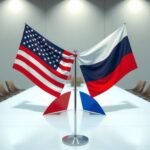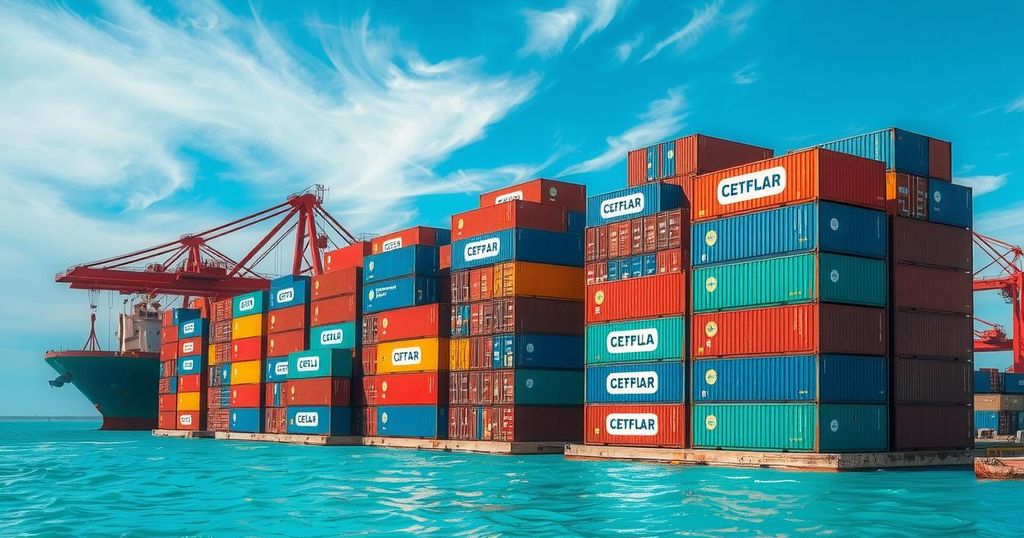Conflicts
Politics
ANTONY BLINKEN, DIPLOMACY, DIRIYAH PALACE, EUROPE, EUROPE/ASIA, FAI, FAISAL BIN FARHAN, INTERNATIONAL RELATIONS, KREMLIN, KYIV, LA, LAVROV, MARCO RUBIO, MIKE WALTZ, MOSCOW, MUSA, MUSAED AL ALBAN, PEACE NEGOTIATIONS, PUTIN, RUBIO, RUSSIA, RUSSIA-UKRAINE WAR, RUSSIAN INVASION OF UKRAINE, SERGEY LAVROV, STEVE WITKOFF, TRUMP, U. K, UKRAINE, USHAKOV, VLADIMIR PUTIN, VOL, VOLODYMYR ZELENSKYY, WAR, YURI USHAKOV
Sophia Klein
U.S. and Russian Diplomats Meet in Saudi Arabia to Discuss Ukraine War Without Ukrainian Participation
Top U.S. and Russian diplomats convened in Saudi Arabia to discuss enhancing relations and negotiating an end to the Ukraine war. The meeting excluded Ukrainian officials, raising concerns about the implications of any potential agreements. European allies voiced apprehension, urging for included dialogue and security guarantees for Ukraine. Saudi Arabia’s role as a mediator reflects its growing diplomatic ambitions in international relations regarding global conflicts.
On Tuesday, senior U.S. and Russian officials convened in Saudi Arabia to discuss enhancing diplomatic relations and establishing a framework for concluding the war in Ukraine. U.S. Secretary of State Marco Rubio and Russian Foreign Minister Sergey Lavrov led their respective delegations at Diriyah Palace. This meeting represents a strategic shift in U.S. policy under the Trump administration, seeking to transition from isolationist strategies towards collaborative dialogues with Russia.
President Trump previously announced an intention to negotiate with Russia regarding the conflict in Ukraine, a significant departure from prior policies. However, Ukrainian officials have been excluded from this dialogue, leading President Zelenskyy to express concerns that any agreements made without their input would be unacceptable. As such, the dynamics surrounding the discussions have stirred unease among Ukrainian and European partners.
Rubio was joined by notable advisors, including national security adviser Mike Waltz and Special Envoy Steve Witkoff, while Lavrov had Kremlin adviser Yuri Ushakov at his side. Initial discussions featured the Saudi Foreign Minister and national security adviser but were expected to conclude early in the meetings. Ushakov clarified that the talks would strictly focus on U.S.-Russian bilateral relations, with no Ukrainian officials participating.
These negotiations notably expand contacts between the U.S. and Russia amidst an ongoing conflict that has strained relations to unprecedented lows. Previous limited interactions, such as between Lavrov and former Secretary of State Antony Blinken at a G-20 meeting and earlier spymaster discussions in Turkey, have not resolved broader geopolitical tensions.
In light of these developments, European leaders convened in response to the potential for an agreement between the U.S. and Russia that may undermine support for Ukraine. French President Emmanuel Macron, having spoken with Trump and Zelenskyy, emphasized the need for robust security guarantees for Ukraine and stressed the importance of collaborative efforts among allies for lasting peace.
British Prime Minister Keir Starmer’s statement regarding the potential deployment of British troops to Ukraine marked a notable commitment towards ensuring stability in the region. Sweden has also signified its support for deploying force to maintain peace, although other European nations have refrained from defining specific commitments, citing uncertainty regarding the discussions of peacekeepers in Ukraine.
Saudi Arabia’s role in hosting the talks highlights its aspirations to serve as a mediator in global conflicts, aiming to solidify its status in international diplomacy. Kirill Dmitriev of the Russian Direct Investment Fund underscored the global significance of fostering positive U.S.-Russia relations, describing joint efforts as essential for addressing complex global challenges.
The venue for this dialogue, Diriyah Palace, symbolizes Saudi Arabia’s ambitions within the geopolitical landscape, especially as it has previously fostered negotiations regarding hostage situations and facilitated discussions with Zelenskyy at the Arab League summit earlier. Hosting these high-stakes talks contributes to Crown Prince Mohammed bin Salman’s efforts to craft a diplomatic image for the Kingdom, contrary to previous criticisms by Western leaders.
The recent U.S.-Russia talks in Saudi Arabia mark a critical attempt to reshape diplomatic relations and seek a resolution to the Ukraine conflict, albeit without Ukrainian representation. This exclusion has sparked concerns among Ukrainian officials and European allies regarding the implications for Ukraine’s sovereignty and security. The overarching objective remains securing lasting peace, with key leaders advocating for robust support and guarantees for Ukraine as negotiations progress. Moreover, Saudi Arabia’s hosting of these discussions reinforces its diplomatic ambitions, reflecting a desire to position itself as a mediator in international affairs. The evolving dynamics amid these high-level meetings may greatly influence the future of geopolitical relations and the ongoing conflict in Ukraine.
Original Source: www.cbsnews.com








Post Comment